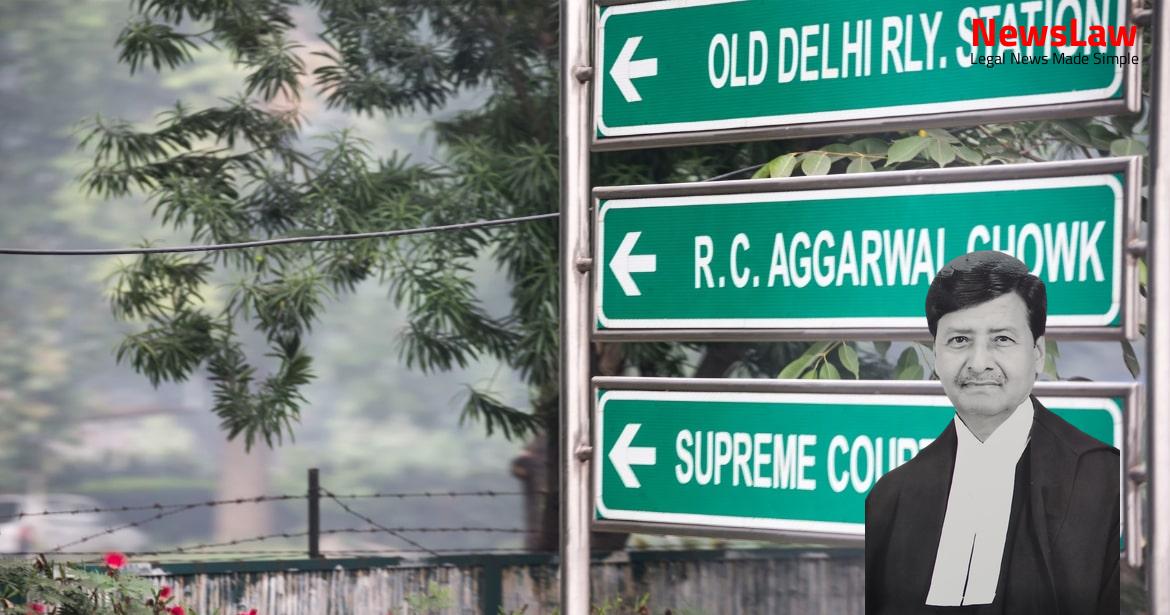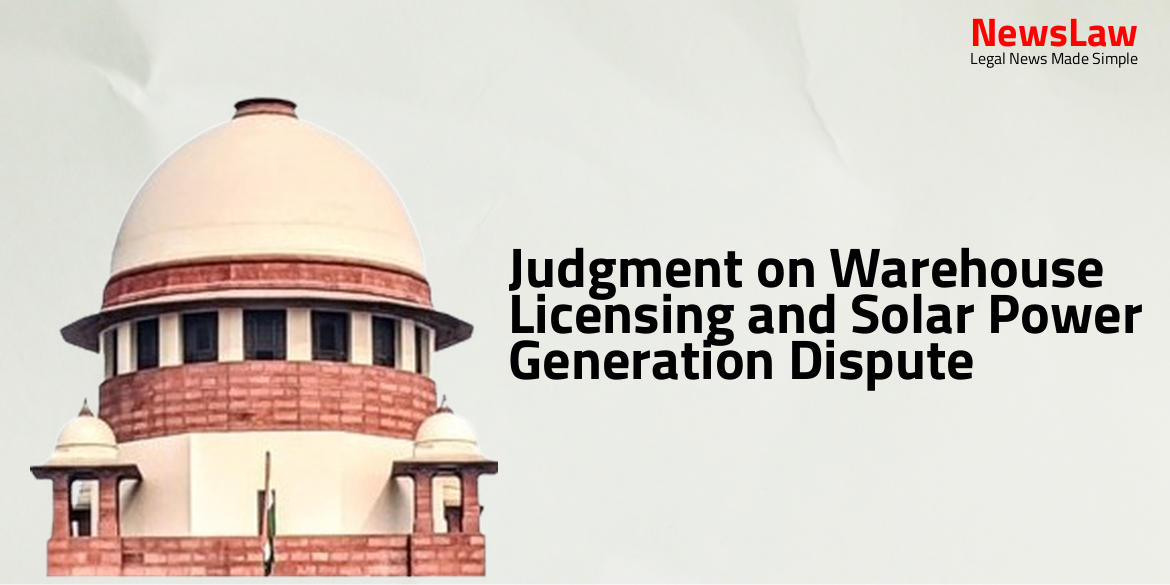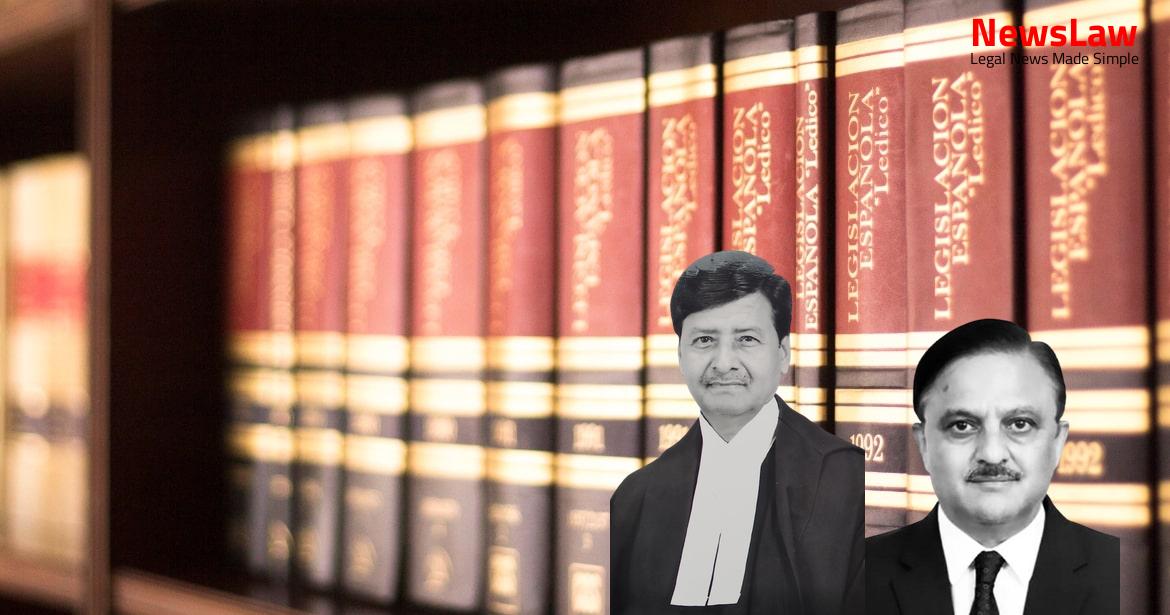Explore the intricate legal analysis surrounding jurisdiction and disciplinary proceedings in a recent case. The court’s interpretation of regulations and principles of natural justice provides valuable insights into the case’s complexities. Delve into the legal intricacies with our detailed summary.
Facts
- The appellant sought to file an additional affidavit explaining the delay in the case.
- The respondent was prosecuted for various offences under different sections of the Prevention of Corruption Act and the Penal Code.
- The Division Bench restrained the appellant from passing final orders pending the criminal appeal.
- The appellant filed a Special Leave Petition before this Court against the Division Bench’s judgment.
- The delay in the appeal was condoned, and the case is pending before the High Court.
- The prosecution was initiated by the Central Bureau of Investigation.
- The respondent challenged his conviction by filing a criminal appeal before the High Court.
- Arguments were presented regarding the appellant’s entitlement to proceed against the respondent upon his conviction, citing relevant regulations and legal provisions.
- The High Court’s order regarding refraining from taking action against the respondent pending the appeal was contested.
- Different court cases were cited to support various arguments presented.
- There was a delay of 257 days in filing the Special Leave Petition, which was addressed with an additional affidavit explaining the delay.
- The respondent was convicted and sentenced to two years of rigorous imprisonment for offences under Sections 420, 467, 468, and 471 read with Section 120B of the Penal Code, and Sections 13(1)(d) and 13(2) of the Prevention of Corruption Act.
- A notice to show cause was issued by the appellant under Regulation 39(4) of the Life Insurance Corporation of India (Staff) Regulations 1960.
- The respondent had appealed against his conviction for offences under the Prevention of Corruption Act 1988 and the Indian Penal Code 1860.
- The respondent’s services were confirmed after being appointed as a Probationary Development Officer.
- The respondent was found guilty of misconduct in a disciplinary enquiry and his basic pay was reduced to the minimum of the time scale.
- The conviction of the respondent was not stayed by the learned Single Judge’s order dated 21 August 2014, only the sentence was suspended.
- The notice of termination was based on the respondent’s conviction, and no question of double jeopardy arose.
Also Read: Legal Analysis on Arbitration Petition Limitation Period
Arguments
- Responding to the submissions of the appellant, Mr Harin P Raval, learned Senior Counsel for the respondent argued that the respondent was initially proceeded against under Regulation 39(1)(a to g) of the 1960 Regulations.
- The facts leading to the disciplinary proceedings and criminal prosecution were the same.
- The appellant had already imposed a penalty during the disciplinary proceedings by reducing the respondent’s basic pay to the minimum of the time scale, exhausting its disciplinary jurisdiction.
- The appellant is not entitled to issue a fresh notice for removal from service as per Regulation 39(4) which dispenses with the requirement of a notice to show cause and an opportunity to defend.
Also Read: Analysis of High Courts’ Jurisdiction and Court Orders Under Article 142
Analysis
- The appellant issued a notice to show cause to the respondent following his conviction by the Special Judge CBI, which was within jurisdiction as per Regulation 39(4) of the 1960 Regulations.
- The respondent himself interpreted the order of the Single Judge as suspending only his sentence, not staying the conviction.
- Regulation 39(2) of the 1960 Regulations mandates compliance with principles of natural justice by providing the employee with a reasonable opportunity to defend against charges.
- Regulation 39 deals with penalties, and under Regulation 39(1) penalties for misconduct are specified.
- The court disapproved the view that action under Article 311(2) was impermissible until the appeal against conviction was decided.
- Under Regulation 39(4)(i), the appellant can take steps independently if a penalty is imposed based on conduct leading to a criminal conviction.
- The appellant’s disciplinary jurisdiction was exercised in imposing a penalty on the respondent after a disciplinary enquiry for misconduct.
- Regulation 39(4) operates with a non-obstante clause overriding other provisions.
- The notice issued under Regulation 39(4) pertained to the criminal conviction of the respondent.
- The court has the exceptional power to suspend a conviction in criminal appeals, but the respondent’s sentence was only suspended and not the conviction itself.
- In HC Narinder Singh, there was no conviction based on a criminal charge
- In K C Sareen v CBI, termination of services followed conviction under Penal Code sections
- Lt Governor, Delhi v HC Narinder Singh is distinguishable from the present case
- In Dy Director of Collegiate Education (Admn) v S Nagoor Meera, the principle of double jeopardy was rejected
- State of Haryana v Balwant Singh involved imposition of major penalty without convening a separate inquiry
- The single judge correctly dismissed the special civil application filed by the respondent.
- The Division Bench’s judgment restraining the appellant from making a final decision on the show cause notice lacks a valid legal basis.
Also Read: Electoral Malpractices in Mayor Election
Decision
- The Court confirms the order of the single judge dismissing the Special Civil Application filed by the respondent.
- No costs are awarded in this matter.
- The appeal is allowed, and the impugned judgment and order of the Division Bench dated 10 April 2018 are set aside.
Case Title: LIFE INSURANCE CORPORATION OF INDIA Vs. MUKESH POONAMCHAND SHAH (2020 INSC 224)
Case Number: C.A. No.-001804-001804 / 2020



